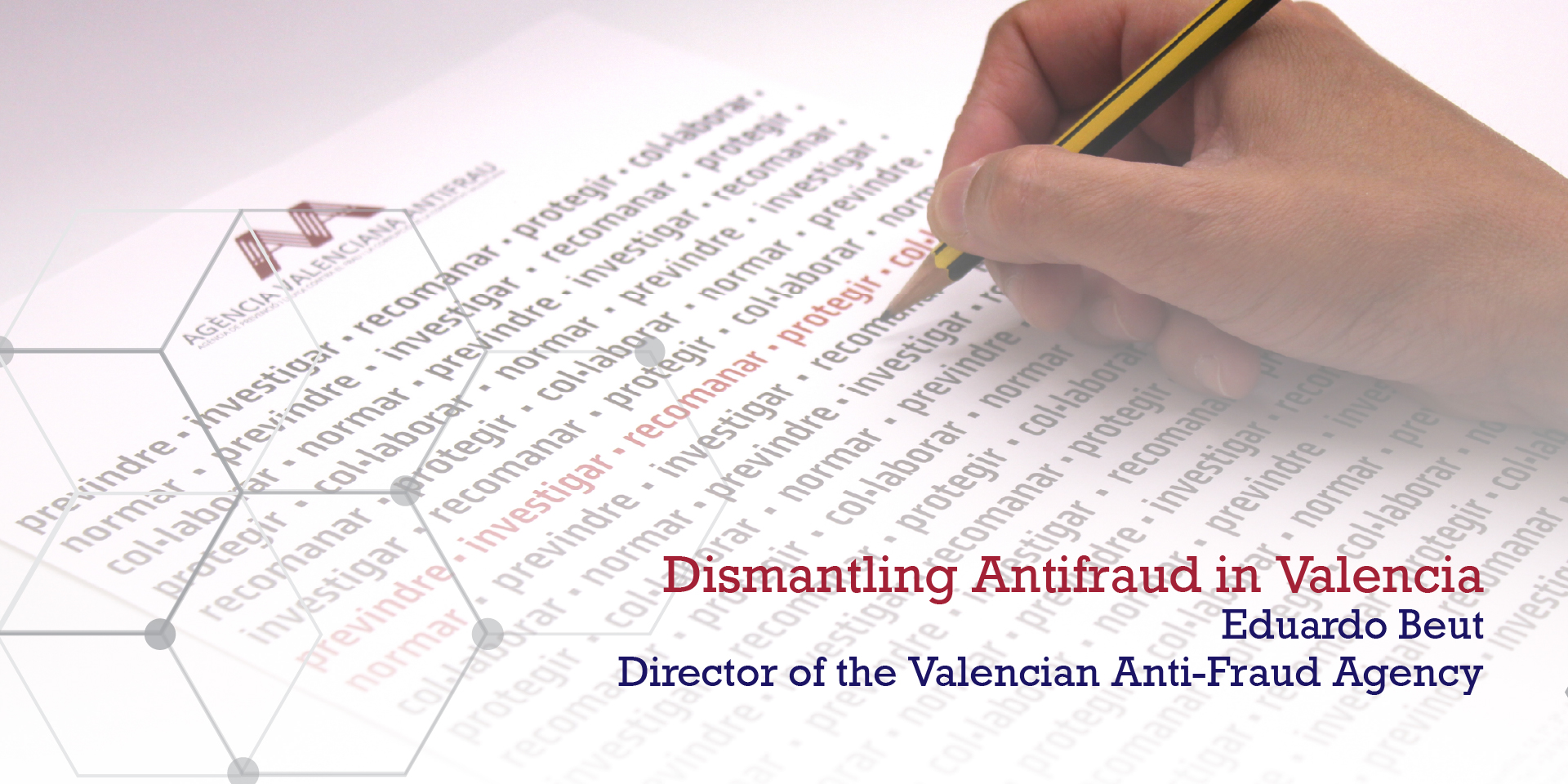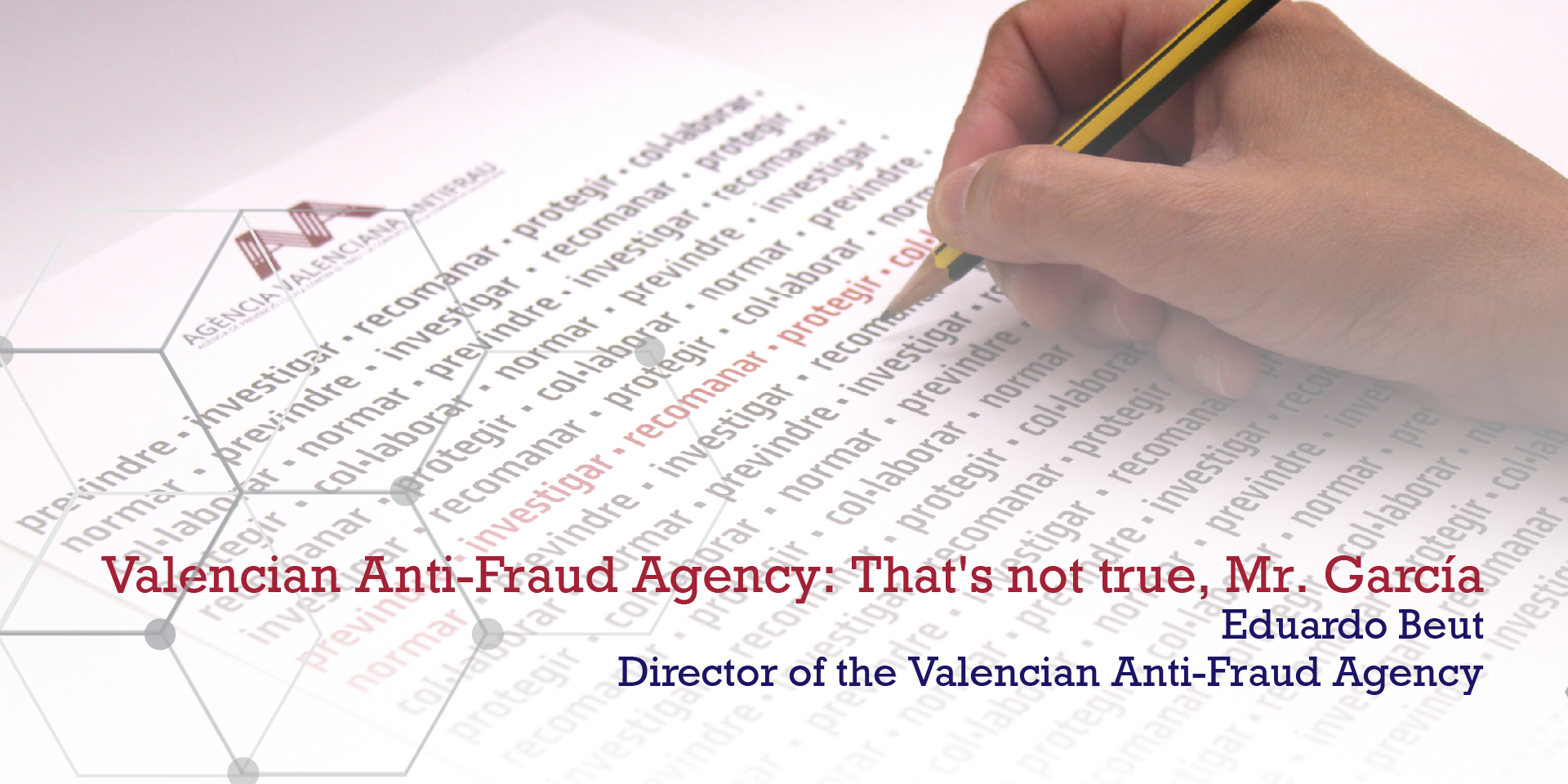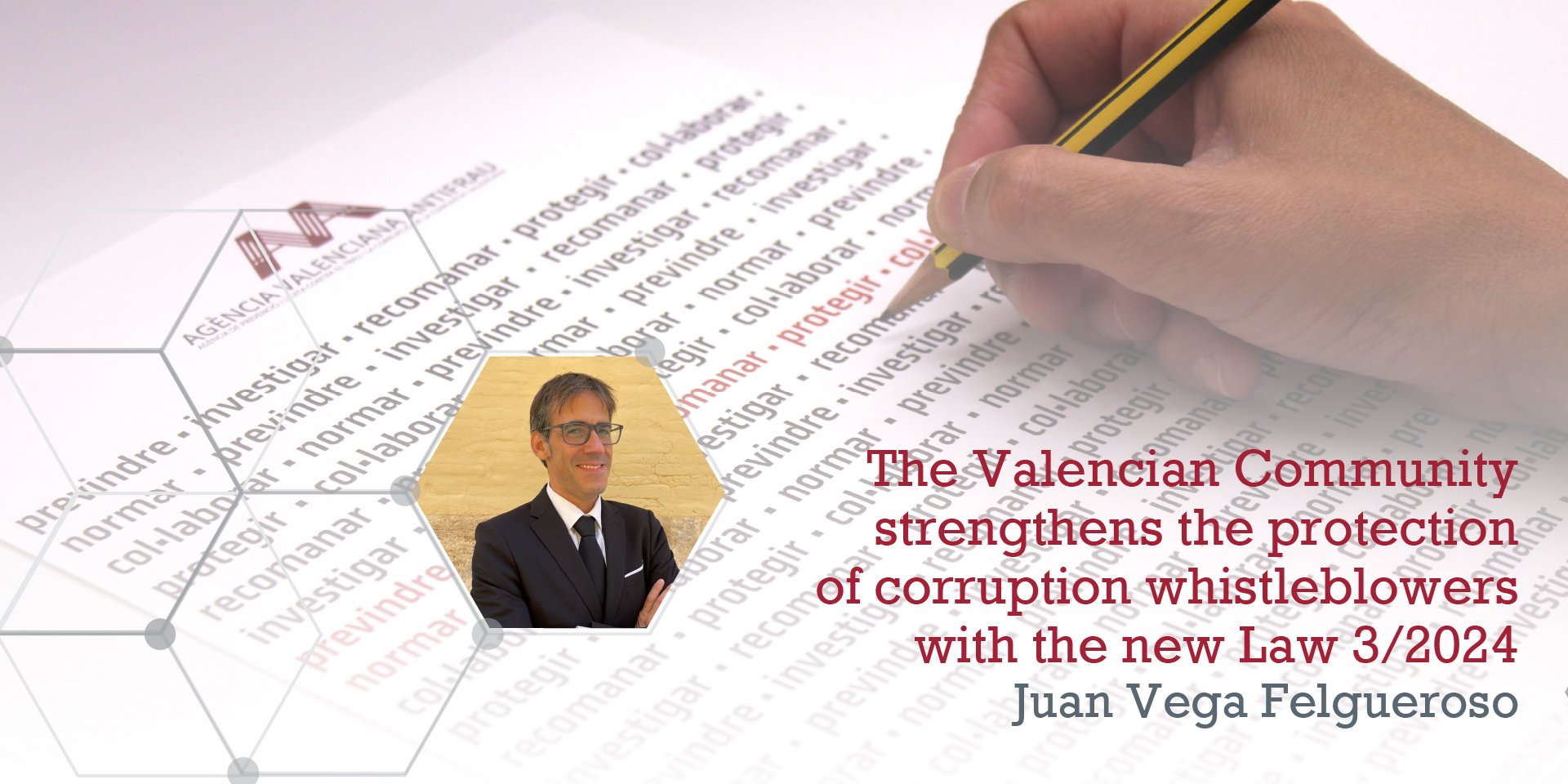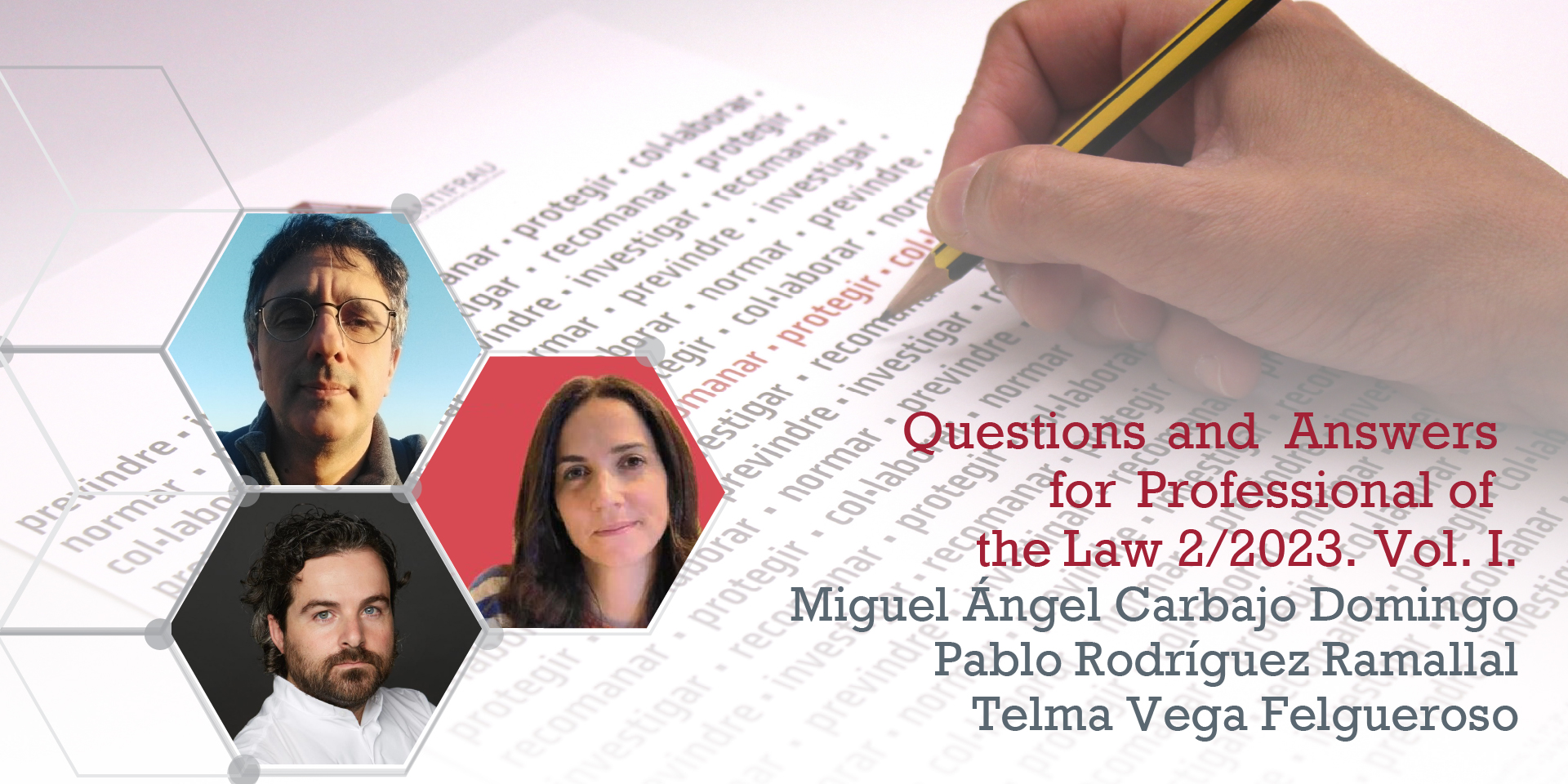In reference to the interview published in a national newspaper, on June 21, 2025, with Mr. Fernando Jiménez Sánchez. After requesting the media, on two occasions, the publication of this opinion article to exercise the right to reply to Mr. Jiménez’s statements about the Valencian Anti-Fraud Agency and not obtaining a response about its publication, we share the opinion article sent:
Dismantling Anti-Fraud in Valencia
In recent months, a worrying practice has spread: constructing narratives where facts are secondary, data become accessories and victimization, fueled by growing polarization, becomes the discursive axis. Conferences, conferences and tribunes follow one another frequently, and although the Valencian Anti-Fraud Agency (AVAF) does not appear as a central issue, the opportunity to revile it with statements disconnected from reality is not wasted. It is even more serious if we consider that many of the rapporteurs have had links, direct or indirect, with this institution.
It seems that some would rather see the Agency disappear than admit that it may be run by people outside their circle of trust. Between nostalgic reproaches and epic stories of the past, an idealized image of the previous stage is constructed, contrasting it with an almost Machiavellian vision of the present.
In this context, Mr. Jiménez, in a recently published interview, responded to a question about the alleged “dismantling” of the AVAF with a double statement:
“Why have they destroyed the AVAF in practice? Well, it is closely related to the judicial expert reports that were being carried out by the investigation team of the corruption trials of the Zaplana era. It’s as simple as that. This destroys the country…”
In view of such a statement, it is appropriate to offer objective data: on May 16, 2024, AVAF officials defended the expert report referred to in court. That performance concluded that same day. The new director took office on July 23, 2024, and the judgment of the Provincial Court was issued on October 15, 2024. Chronologically, it is impossible for there to have been any intervention by the new leadership in that case. Therefore, the insinuation is unfounded and malicious. From the AVAF we wonder if an administrative infraction is being suggested or, directly, the commission of a crime. Hurling accusations without evidence, in the style of “throwing the stone and hiding the hand”, does not seem to be the procedure of an academic.
The AVAF depends organically on Les Corts Valencianes, not on the Government of the Generalitat Valenciana. Since August 1, 2024, the parliamentary groups have requested 55 files, all of them delivered in a timely manner. Most refer to actions from the previous mandate. When the new management took office, there was a live load of 659 files. Currently, and despite having received 331 new complaints in 2025, this figure has been reduced to 512.
As of 23 July 2024, the delay in the processing of complaints exceeded 15 months; Today, complaints filed in 2025 are being resolved within the deadline. In addition, 200 new entities have been added to the register of those responsible for the Internal Information System (67 public and 133 private).
Far from being diminished, the Agency’s powers have increased. I must also point out that the positions of Secretary General and Coordinator of the Evaluation, Verification and Inspection area have recently joined this Agency, following a selection process, incorporating a Lawyer from the Generalitat Valenciana and a Tax Inspector from the State Tax Agency. Files continue to be sent to the Public Prosecutor’s Office and its operational activity has been strengthened. All while keeping your budget intact.
It is striking that someone with Mr. Jiménez’s academic background – a professor, member of Transparency International and the advisory board of the Hay Derecho Foundation – would make such unfounded statements. Until their legal suppression, the aforementioned organizations were part of the AVAF’s Citizen Participation Council (CPC). He himself was appointed to that body directly by the previous director, without formally representing any entity.
The surprise is even greater if one remembers that, as a representative of the University of Murcia, together with the University of Lisbon, Mr. Jiménez prepared the report “Comparative perceptions of corruption in Spain and Portugal”, with logistical and economic support from the AVAF (October 2022).
Likewise, the previous management of the Agency was going to collaborate in a European project, with Mr. Jiménez himself as principal investigator. Despite the interest in the project, the new management of the AVAF declined to participate because it exceeded the scope of regional competence.
Perhaps the disagreement lies in the succession in the position of director. Mr. Jiménez’s candidate — also the outgoing director and the vast majority of the CPC — was not elected. The legitimate defence of a candidacy does not justify a campaign of constant discredit, which began even before the current director took office. Much less so when the criticism extends to the entire institution and, therefore, to its officials.
And they continue along these lines. In a conference on the protection of corruption whistleblowers in Spain with the presence of former heads of the AVAF, the debate revolved more around the “golden age” of the Valencian Agency than on the announced title. It could well have been titled: “When we were the best”.
During the event, someone claimed that the recent legislative reform had abolished the Agency’s sanctioning regime. The statement was denied, at the same event, by a lawyer from the AVAF. He recalled that Law 11/2016 continues to attribute sanctioning power to management and that Law 2/2023 reinforces it, recognising the AVAF as the regional competent authority for the protection of whistleblowers. Even so, the official recording omits the interventions of the AVAF representatives, preventing a complete technical vision of the debate and compromising transparency.
Paradoxically, those who today lament the alleged loss of the sanctioning regime did not apply it for seven years. The only sanction imposed in that period was directed at a city council for refusing to collaborate. The lament for the loss of a tool that was barely used is surprising.
It was also stated that, by ceasing to prepare expert reports, the regional agencies were meaningless and “it would be better to close them”. It is worth remembering that only the AVAF has issued such reports (37, according to one of the speakers), while the rest of the regional agencies have not even issued one, according to their reports. Again, only the Valencian agency is attacked. But corruption schemes, unfortunately, can be cited in all communities with their own agency.
The functions of judicial collaboration are formally included in agreements such as the one signed on June 19, 2023 between the AVAF and the Anti-Corruption Prosecutor’s Office. Clause 1(b) expressly provides for the request for technical support. And, in addition, the current leadership has not rejected this collaboration and reiterates its commitment to the rule of law. It should be noted that, except for one person, the technical team that prepared the expert reports is still on staff.
In the same interview, Mr. Jiménez added:
“I don’t care about the PP or the PSOE: my friend Manuel Villoria has been appointed president of the Independent Authority for the Protection of Whistleblowers; there is no staff or budget and everything has to go through the Ministry of Justice. What independent authority is that?”
The answer is surprising, coming from someone who elegantly defended the importance of institutional selection procedures. Even more surprising is the silence of those who vehemently censured the Valencian reform of 2024 – which provides for parliamentary elections with a reinforced or absolute majority – omitting that it is attached to Les Corts Valencianes. Surprising because they now do not object to the fact that, at the state level, the appointment of the president of the Independent Authority for the Protection of Whistleblowers (AAI) (art. 53 of Law 2/2023) falls directly on the Council of Ministers, at the proposal of the Minister of Justice, without curricular evaluation or qualified majority. And the president is appointed with the rank of undersecretary.
Here no one seems bothered by the absence of competitive competition, the laxity of the requirements or the opacity of the process, there was not even a qualification body that after examining the candidacies raised a list of three candidates for the presidency of the AAI. This critical asymmetry highlights a worrying phenomenon: selective delegitimization. What is legitimate if decided by one like-minded environment becomes “institutional capture” if decided by another. The democratic standard cannot be applied according to personal or ideological affinity.
And this way of acting is projected in the selection of the AAI’s managerial staff, manager and director: summoned by free designation, published in the BOE on Saturday, with meagre deadlines (10 calendar days) and procedures that do not guarantee much: presentation of a curriculum vitae and a self-evaluation and those who pass the filter seem to be subjected to an interview by an expert to be determined. If this selection process is an essay by the current minister of the branch on procedures to be applied in the selection of prosecutors, state lawyers, tax inspectors… The concern installed in these groups is understandable.
Finally, it is worth remembering an obvious fact: if someone were to try to “control” the AVAF – a one-person institution if ever there was one – they would not eliminate the Council of Citizen Participation, but would simply do what was done previously, modify its composition according to their interests. Of course, it would retain what it inherited: a workforce made up mostly of personnel selected by free appointment. Instead, a new List of Jobs (RPT) was approved in December 2024 that imposes the provision of posts through competition, thus reinforcing the independence, autonomy and professionalism of the Agency’s officials.
Likewise, those who wished to exercise discretionary control would maintain procedures with interpretative gaps and ambiguous expiration periods in the area of verification and investigation, in order to use these regulatory gaps at their convenience. However, four Instructions on procedure have been issued and two technical offices independent of the directorate have been created: one in charge of the selection and distribution of complaints among investigators, and another aimed at standardizing the criteria for action.
And yes, due to the sensitivity of the issues discussed, this new stage of the AVAF is more similar – in terms of secrecy, professionalism and data protection – to the model of the State Tax Administration Agency than to other formats disguised as transparency that, through media sanction, base their legitimacy on an ecosystem of people with shared interests and systematically resorting to victimhood. Confusing public opinion by making them believe that they and not the Institution are the indispensable ones.
Eduardo Beut
Sent to the media: July 10, 2025








